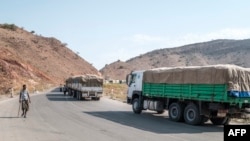The contradictory claims come as representatives of the warring sides have been meeting in the Kenyan capital Nairobi to follow up on the breakthrough agreement signed in the South African capital Pretoria on November 2.
"70% of Tigray is under ENDF (Ethiopian National Defence Force)," Prime Minister Abiy Ahmed's national security adviser Redwan Hussein posted on Twitter.
"Aid is flowing like no other times," he said, adding that trucks of food and medicine had been sent to the strategic city of Shire and that flights were being allowed.
"No hindrance whatsoever regarding aid."
But the rebels denied Redwan's assertions.
"He is plucking his facts out of thin air," TPLF spokesman Getachew Reda told AFP in a message.
Redwan's comments were also dismissed by a humanitarian worker based in Tigray.
"What Redwan tweeted is completely false," the worker told AFP. "No aid is allowed to enter Shire city at all.
"No services have been reconnected and no flights are allowed."
AFP was not able to independently verify the claims as Tigray -- a region of about six million people -- remains inaccessible to journalists.
Military chiefs from the warring sides have been holding talks in Nairobi this week to discuss disarmament and the restoration of aid among other issues.
The US State Department's African bureau noted that Redwan had said in Nairobi that by week's end humanitarian aid would flow "unhindered".
"Vulnerable Ethiopians in Tigray, Afar, and Amhara need aid now," it said on Twitter early Friday.
"Also restoration of services, protection of civilians & human rights accountability. Waiting urgently for actions to respect and implement the agreement."
On Wednesday, the World Health Organization called for a massive influx of food and medicines into Tigray following the ceasefire deal, saying aid had not yet been allowed in.
"Many people are dying from treatable diseases. Many people are dying from starvation," WHO chief Tedros Adhanom Ghebreyesus, who hails from Tigray, told a press conference.
"Even in the middle of fighting, civilians need food, need medicine. It cannot be a condition."
Estimates of casualties vary widely, with the United States saying that as many as half a million people have died, while the EU's foreign envoy Josep Borrell said that more than 100,000 people may have been killed.
UN-backed investigators have accused all sides of committing abuses but also charged that Addis Ababa had been using starvation as a weapon of war -- claims denied by the Ethiopian authorities.







